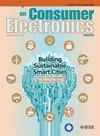Guest Editorial Quantum in Consumer Technology: Opportunities and Challenges
IF 10.9
2区 计算机科学
Q1 ENGINEERING, ELECTRICAL & ELECTRONIC
引用次数: 0
Abstract
Quantum computers leverage the principles of quantum mechanics, including superposition and entanglement, allowing them to execute specific computations significantly faster than classical computers. The gate model is a common way to implement quantum algorithms, where the algorithms are broken down into a sequence of simple gates that operate on one or more quantum bits. This manipulation of a quantum computer involves a succession of unitary transformations that affect the different components of the superposition simultaneously, enabling significant parallel data processing and reducing the time of execution. As a result of these capabilities, quantum technology is expected to provide abilities and performance that are currently unattainable by classical methods. However, quantum hardware is under development and is prone to errors, which can negatively impact the performance of quantum methods. To address this challenge, error mitigation techniques are developed to reduce the impact of errors on the final outcomes. By leveraging the speedup offered by quantum hardware and using effective error mitigation techniques, quantum computing holds the promise of outperforming classical methods in various consumer applications (CA).消费技术中的量子:机遇与挑战
量子计算机利用了量子力学的原理,包括叠加和纠缠,使它们能够比经典计算机更快地执行特定的计算。门模型是实现量子算法的一种常用方法,其中算法被分解成一系列简单的门,这些门在一个或多个量子比特上运行。这种对量子计算机的操作涉及到一系列的统一变换,这些变换同时影响叠加的不同组成部分,从而实现重要的并行数据处理并减少执行时间。由于这些能力,量子技术有望提供目前传统方法无法实现的能力和性能。然而,量子硬件还处于开发阶段,容易出现错误,这可能会对量子方法的性能产生负面影响。为了应对这一挑战,开发了错误缓解技术,以减少错误对最终结果的影响。通过利用量子硬件提供的加速和使用有效的错误缓解技术,量子计算有望在各种消费者应用程序(CA)中超越经典方法。
本文章由计算机程序翻译,如有差异,请以英文原文为准。
求助全文
约1分钟内获得全文
求助全文
来源期刊
CiteScore
7.70
自引率
9.30%
发文量
59
审稿时长
3.3 months
期刊介绍:
The main focus for the IEEE Transactions on Consumer Electronics is the engineering and research aspects of the theory, design, construction, manufacture or end use of mass market electronics, systems, software and services for consumers.

 求助内容:
求助内容: 应助结果提醒方式:
应助结果提醒方式:


